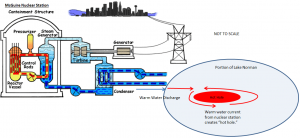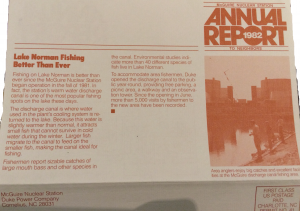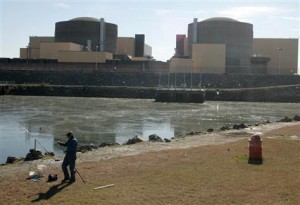McGuire Nuclear station uses Lake Norman’s water for cooling. The lake water is pumped into the station’s system and returned back to the lake but at higher temperatures. The warm water discharge from McGuire Nuclear Station has created “hot holes” in the lake. These hot spots are areas of warm water that fish tend to congregate in. Fishermen mine these hot holes for largemouth and spotted bass or catfish on the lake. This anthropogenic creation of warm water areas has had an affect on fish biology and has also attracted visitors to fish on Lake Norman.
Contents
Fishing booms within first year of opening
Even within its first year of opening (1982), Duke Power was fairly open about how the lake water was used by the nuclear station. The image to the right is from Duke Power’s 1982 report on McGuire Nuclear Station. The diagram shows how the cooler lake water is pumped into the system and then returned back to the lake at a higher temperature.
In Duke Power’s Annual 1982 Report on McGuire Nuclear Station, the warm water discharge was boasted to have brought in over 5000 visits by fisherman since the plant’s opening in June of that year. The report (seen to the left) even explains that the warm water discharge allows small fish to thrive during winter, attracting larger fish, making the area ideal for fishing. So, it seems that McGuire Nuclear Station was able to greatly increase visitors to the Lake Norman area within its first year of opening.

McGuire’s warm water current creates “hot hole.”Adapted from: “PressurizedWaterReactor” by U.S.NRC. – http://www.nrc.gov/reading-rm/basic-ref/students/animated-pwr.html. Licensed under Public Domain via Wikimedia Commons – http://commons.wikimedia.org/wiki/File:PressurizedWaterReactor.gif#mediaviewer/File:PressurizedWaterReactor.gif
Hot Hole Fishing Still Relevant near McGuire Nuclear Station Today
Fast forward thirty years, and McGuire Nuclear Station’s warm water discharge is still creating hot holes that fishermen love to take advantage of. Fishing guide Joel Richardson is familiar with hot hole fishing around Duke Energy’s Belews Creek Steam Station. Richardson believes that the current produced by the station is just as important as the warm water discharge because “the current really focuses where the fish are going to be, waiting to ambush baitfish.”¹ Similarly, McGuire Nuclear Station’s warm water discharge can dictate where fish will congregate and in turn where fishermen will cast their lines. The attraction of hot hole fishing at Lake Norman has had an economic and social impact on the area.
Hot Hole Fishing and Biology
In addition, the hot holes created by McGuire allow for fishing on Lake Norman even during the winter off-season. Jerry Neely of Jerry’s Fishing Guide Service stated that hot hole fishing is “a good opportunity for anybody who enjoys fishing to catch fish all winter.”² Without McGuire Nuclear Station, not only would electrical power be seriously diminished in the greater area, but fishing on Lake Norman would not be what it is today.
Not only has McGuire Nuclear Station affected Lake Norman’s fishing industry, but it also may have had an ecological effect on fish biodiversity in the lake. The warm water discharge is said to fool fish into thinking it is spring time during the winter season, which could have an effect on mating patterns. Other ecological effects could include:
• Elevated water temperatures can decrease dissolved oxygen levels in the lake (Goel, 2006).
• Warmer waters can increase the metabolic rate of aquatic organisms, which in turn can result in fewer resources, compromising the food chain of the local ecosystem (Laws, 2000).
• Higher water temperature can increase plant growth rates, which can also cause algae bloom and reduce oxygen levels (Laws, 2000).
• Increased water temperature can affect fish metabolism and harm reproduction and even cause death (Goel, 2006).
Such ecological effects suggest that a study on lake water chemistry and fish biodiversity near McGuire could be useful. However, fishing guide Joel Richardson stated that the effect of the hot hole at Belews Creek is much stronger than that of Lake Norman³, which suggests that fish biodiversity at Lake Norman may not be at risk.
Back to Home Page – McGuire Nuclear Plant: Intersections of Science, Policy, and People


